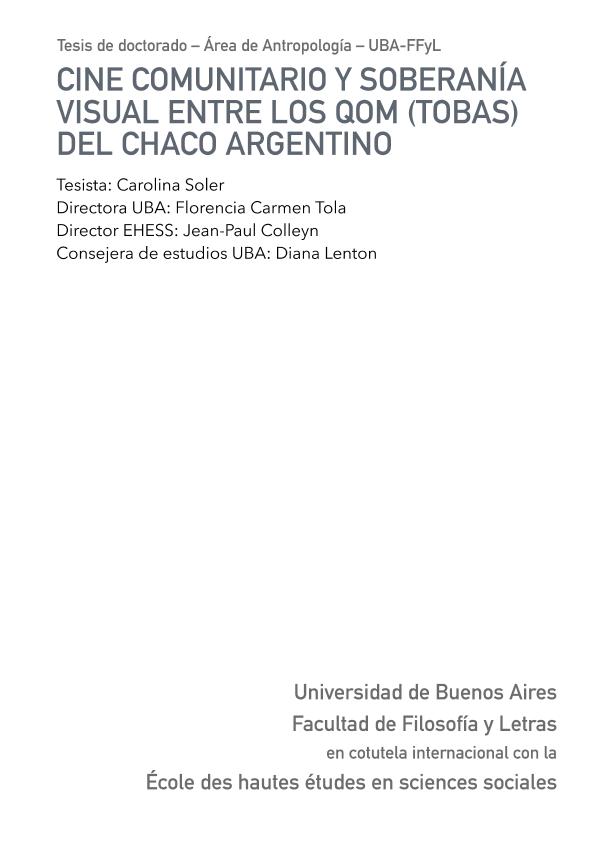Mostrar el registro sencillo del ítem
dc.contributor
Tola, Florencia Carmen

dc.contributor
Colleyn, Jean Paul
dc.contributor
Lenton, Diana Isabel

dc.contributor.author
Soler, Carolina

dc.date.available
2019-09-04T21:47:42Z
dc.date.issued
2019-03-27
dc.identifier.citation
Soler, Carolina; Tola, Florencia Carmen; Colleyn, Jean Paul; Lenton, Diana Isabel; Cine comunitario y soberanía visual entre los qom (tobas) del Chaco argentino; 27-3-2019
dc.identifier.uri
http://hdl.handle.net/11336/82946
dc.description.abstract
A partir del año 2008, distintos agentes vinculados al Estado provincial del Chaco (República Argentina) generaron iniciativas de enseñanza y difusión del cine entre sus poblaciones indígenas, y, consecuentemente, se creó un espacio específico de cine indígena dentro del recién fundado Instituto de Cultura del Chaco, en el marco del Departamento de Cine y Espacio Audiovisual. Tras un trabajo de campo etnográfico multisituado entre los qom (tobas) del Chaco argentino, esta tesis se propone indagar sobre el surgimiento de este cine, así como también sobre las experiencias de enseñanza de cine llevadas a cabo por la propia autora. Se toma el concepto soberanía visual propuesto por Michelle Raheja (2010), que define un posicionamiento político hallable en las primeras experiencias de cine indígena desarrolladas en el Chaco. Se muestra como esta noción se pone en tensión cuando la indigeneidad de algunas producciones audiovisuales es puesta en duda por un público hegemónico o, incluso, cuando las representaciones registradas en video son rechazadas por miembros de la propia comunidad. Se presenta también la noción de cine como mediación —cine médium—, realizado comunitariamente, en el que la primera persona generalmente se desdibuja y la cuestión autoral opera través de singulares consensos sociales que implican, además de tensiones, la redefinición de los roles y el planteo de nuevas estrategias realizativas. Más allá del proceso de realización de una película, esta noción atraviesa las relaciones entre los jóvenes realizadores y los adultos que los habilitan, entre los seres no humanos y los humanos, entre el pasado y el presente, entre lo local y lo global. En algunos casos se analiza cómo la mediación se da con los elementos y las estéticas foráneas dentro de contextos locales e indígenas y genera novedosos agenciamientos; por otro lado, la noción de mediación se desplaza hacia la ontología del filme y sus afectaciones, y se indaga cómo el registro audiovisual opera sobre el paso del tiempo —fija lo efímero y lo evanescente y hace trascender de la muerte a los seres y los objetos, para traerlos al presente—. Finalmente, se propone la concepción del cine indígena como un cine reverso que pueda presentar las epistemes indígenas, que no se vea obligado a responder a las miradas hegemónicas.
dc.description.abstract
Since the year 2008, different agents linked to the provincial state of Chaco (Argentine Republic) generated teaching and dissemination initiatives of the cinema among their indigenous populations, and, consequently, a specific area of indigenous cinema was created within the recently founded Instituto de Cultura del Chaco, within the framework of the Departamento de Cine y Espacio Audiovisual. After a multisite ethnographic fieldwork among the Qom (Toba) peoples of the Argentinian Chaco, this thesis aims to investigate the emergence of this cinema, as well as the experiences of film education carried out by the author herself. The concept of visual sovereignty proposed by Michelle Raheja (2010) is taken, which defines a political position found in the first indigenous film experiences developed in the Chaco. It shows how this notion is put into tension when the indigeneity of some audiovisual productions is put in doubt by a hegemonic audience or, even when the representations recorded in video are rejected by members of the community itself. It also presents the notion of cinema as mediation -—cine medium—, carried out communally, in which the first person generally blurs, and the authorship operates through singular social consensus that implies, in addition to tensions, the redefinition of roles and the posing of new filmmaking strategies. Beyond the process of making a film, this notion crosses the relationships between the young filmmakers and the adults who enable them, between nonhuman beings and human beings, between the past and the present, between the local and the global. In some cases, it is analyzed how mediation occurs with foreign elements and aesthetics within local and indigenous contexts and generates novel agency; On the other hand, the notion of mediation moves towards the ontology of the film and its affectations, and it is investigated how the audiovisual record operates over the trace of time — fix the ephemeral and evanescent and transcend death to beings and objects, to bring them to the present—. Finally, the conception of indigenous cinema is proposed as a reverse cinema that can present indigenous epistemes, that is not forced to respond to hegemonic views.
dc.format
application/pdf
dc.language.iso
spa
dc.rights
info:eu-repo/semantics/openAccess
dc.rights.uri
https://creativecommons.org/licenses/by-nc-sa/2.5/ar/
dc.subject
Cine Indígena
dc.subject
Soberanía Visual
dc.subject
Chaco Argentino
dc.subject
Qom (Tobas)
dc.subject.classification
Antropología, Etnología

dc.subject.classification
Sociología

dc.subject.classification
CIENCIAS SOCIALES

dc.title
Cine comunitario y soberanía visual entre los qom (tobas) del Chaco argentino
dc.title
Indigenous cinema and visual sovereignty among the Qom (Toba) people of the Argentine Chaco
dc.type
info:eu-repo/semantics/doctoralThesis
dc.type
info:eu-repo/semantics/publishedVersion
dc.type
info:ar-repo/semantics/tesis doctoral
dc.date.updated
2019-07-30T13:56:10Z
dc.description.fil
Fil: Soler, Carolina. Consejo Nacional de Investigaciones Científicas y Técnicas; Argentina. Universidad de Buenos Aires. Facultad de Filosofía y Letras; Argentina
dc.conicet.grado
Universitario de posgrado/doctorado

dc.conicet.titulo
Doctora en Antropología
dc.conicet.rol
Autor

dc.conicet.rol
Director

dc.conicet.rol
Codirector

dc.conicet.rol
Consejero de estudios

dc.conicet.otorgante
Universidad de Buenos Aires. Facultad de Filosofía y Letras

Archivos asociados
